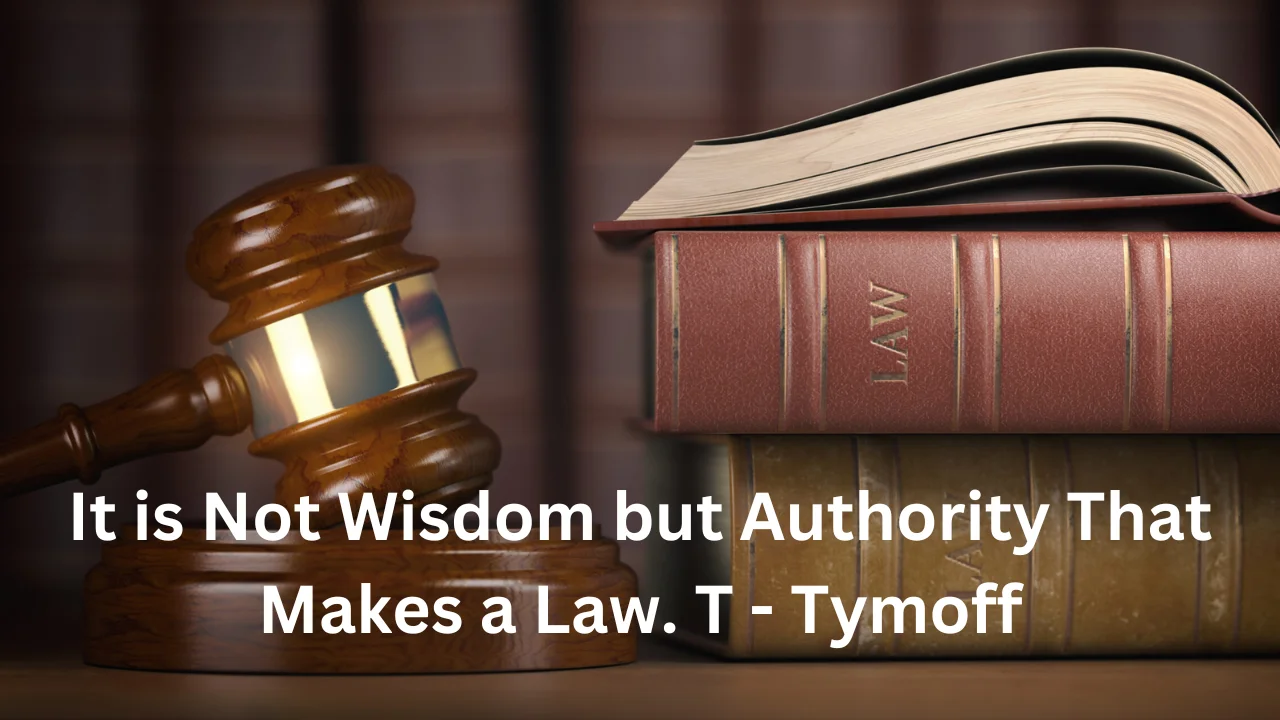In the labyrinth of human civilization, laws and regulations stand as the pillars upon which societies are built, dictating the boundaries of behavior and shaping the very fabric of communal life. This complex web of do’s and don’ts, however, emerges not from the profound depths of collective wisdom but rather from the authoritative decree of those who wield power. This intricate dance between authority and wisdom in law-making is a theme that merits a deeper exploration, particularly through the lens of the provocative assertion by it is not wisdom but authority that makes a law. t – tymoff.”
The Genesis of Law: Authority’s Primacy
At the heart of every legal system is the inherent assumption that those at the helm—the lawmakers—are vested with the authority to dictate what is deemed legal or illegal, right or wrong. This authority, whether derived from divine right, democratic mandate, or conquest, serves as the cornerstone for the establishment and enforcement of laws. It is this authority, often consolidated in the hands of a few, that molds the legal framework within which societies operate.
The historical trajectory of civilizations reveals a pattern where authority, in various guises, has played the pivotal role in law creation. From the divine pronouncements of ancient monarchs to the complex legislative processes of modern democracies, the common denominator remains: those in positions of power are the architects of the legal edifice. This authority is not always predicated on wisdom or the collective good but rather on the capacity to enforce compliance, underscoring the might-is-right paradigm that has characterized much of human history.
The Role of Wisdom in Lawmaking
Wisdom, though idealized as the guiding light for just and equitable laws, often finds itself relegated to a secondary role in the lawmaking process. The essence of wisdom in this context encompasses not only the depth of knowledge and understanding but also the application of ethical considerations, empathy, and foresight in crafting laws that serve the greater good.
In an ideal world, it is not wisdom but authority that makes a law. t – tymoff would be the driving force behind every legislative initiative, ensuring that laws reflect not only the needs of the present but also the aspirations of future generations. However, the annals of history are replete with instances where wisdom was overshadowed by the sheer force of authority, leading to the promulgation of laws that served narrow interests or perpetuated injustices.
The Dichotomy and Interplay Between Authority and Wisdom
The interplay between authority and wisdom in lawmaking is a dynamic and often contentious arena. On one hand, authority without wisdom can lead to autocratic or draconian laws, disconnected from the realities and needs of the populace. On the other hand, wisdom devoid of authority may result in well-intentioned but ultimately unenforceable ideals.
The dichotomy between these two forces is not absolute, and the most enduring legal systems have found ways to balance the two. Democratic governance models, for instance, attempt to mitigate the excesses of unchecked authority by embedding mechanisms for accountability, debate, and public participation, allowing for the infusion of wisdom into the lawmaking process. Yet, even in such systems, the balance is precarious and the tension between authority and wisdom a constant undercurrent.
Case Studies: The Impact of Authority-Driven Laws
Examining specific instances of authority-driven lawmaking provides insight into the complexities and consequences of prioritizing power over wisdom. Historical examples abound, from the Jim Crow laws in the United States, which institutionalized racial segregation and discrimination, to the more recent authoritarian regimes that suppress dissent and limit freedoms under the guise of legality. These cases underscore the potential for authority to craft laws that entrench inequality, suppress freedoms, and undermine the social fabric.
Conversely, when laws emerge from a process that respects wisdom—incorporating scientific knowledge, ethical considerations, and public welfare—they tend to foster social cohesion, promote justice, and facilitate progress. The environmental legislation of the late 20th and early 21st centuries, for example, reflects a growing recognition of the wisdom in preserving our natural world for future generations, even as it battles against powerful, authority-backed industrial interests.
The Path Forward: Reconciling Authority with Wisdom
The challenge, then, is to reconcile the necessity of authority in lawmaking with the indispensable value of wisdom. This reconciliation requires a deliberate restructuring of how laws are conceived, debated, and enacted. Transparency, inclusivity, and accountability are key elements in this process, ensuring that those in positions of authority remain responsive to the wisdom of the collective.
Educating lawmakers and the public about the importance of ethical considerations, long-term impacts, and the common good can also shift the paradigm towards a more wisdom-oriented approach. Additionally, leveraging technology and participatory platforms to democratize the lawmaking process can help bridge the gap between authority and wisdom, ensuring that a broader spectrum of voices is heard and heeded.
Conclusion
The assertion by Tymoff that “it is not wisdom but authority that makes a law” serves as a poignant reminder of the complex interplay between power and prudence in the shaping of legal landscapes. While authority has historically been the driving force behind law creation, the integration of wisdom is crucial for the development of just, equitable, and sustainable societies. The journey towards this ideal is fraught with challenges but remains a worthy endeavor for all who value the principles of justice and the rule of law. In striving to balance the scales between authority and wisdom, societies can forge legal frameworks that not only command obedience but also inspire respect and foster the collective good.




